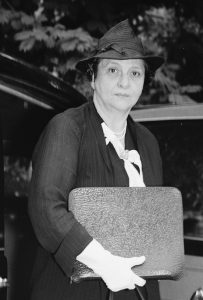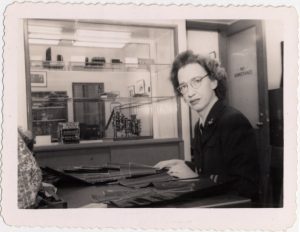INVENTIVE WOMEN IN HISTORY
According to the old proverb, “Necessity is the Mother of Invention,” and Mothers of invention have frequently been women. Throughout March, Women’s History Month, Richmond Public Library is featuring the Picturing Women Inventors Poster Exhibit in the Main Library lobby. The poster exhibition highlights stories of inventors like  Marilyn Hamilton, who after a hang-gliding accident in 1978 left her paralyzed, invented a lightweight wheelchair that was easy to maneuver. Diversity of background and age are showcased including inventor
Marilyn Hamilton, who after a hang-gliding accident in 1978 left her paralyzed, invented a lightweight wheelchair that was easy to maneuver. Diversity of background and age are showcased including inventor

Alexis Lewis, who at 12-years-old in 2011 was inspired to adapt a traditional Native American sled, called a travois, by adding wheels to create a simpler way to transport families and their belongings in Somalia. Others featured in the Poster Exhibit include Ellen Ochoa, Patricia Bath, Grace Hopper, Tara Astigarrara, and Michelle Khine. The Exhibit is provided by the Smithsonian Institution Traveling Exhibition Service and the Lemelson Center for the Study of Invention and Innovation.
Not only have women invented physical things like those featured in the Picturing Women Inventors Poster Exhibit, but women have created businesses, social movements, and even government programs such as the inimitable Frances Perkins, a woman of faith who was the first woman cabinet member. She was appointed Secretary of Labor in 1933 by President Franklin D. Roosevelt. Perkins remained in office briefly after Harry S. Truman assumed the presidency upon Roosevelt’s death, becoming the first woman to hold the same post under separate administrations. In her role as Secretary of Labor, she pushed forward life-altering government programs including Social Security and Unemployment Insurance. Perkins is the subject of many books, including The Woman Behind the New Deal: the Life and Legacy of Frances Perkins—Social Security, Unemployment Insurance, and the Minimum Wage by Kirstin Downey, which will be discussed at the March 14th meeting of the online Oliver W. Hill Book Club. Demonstrating the sustained influence of influencers like Perkins, Author Downey will speak about the current importance of Unemployment Insurance during the recent Covid-19 pandemic.
She was appointed Secretary of Labor in 1933 by President Franklin D. Roosevelt. Perkins remained in office briefly after Harry S. Truman assumed the presidency upon Roosevelt’s death, becoming the first woman to hold the same post under separate administrations. In her role as Secretary of Labor, she pushed forward life-altering government programs including Social Security and Unemployment Insurance. Perkins is the subject of many books, including The Woman Behind the New Deal: the Life and Legacy of Frances Perkins—Social Security, Unemployment Insurance, and the Minimum Wage by Kirstin Downey, which will be discussed at the March 14th meeting of the online Oliver W. Hill Book Club. Demonstrating the sustained influence of influencers like Perkins, Author Downey will speak about the current importance of Unemployment Insurance during the recent Covid-19 pandemic.
Many other women invented new ways of doing old things. Not content with imitating men, they often forged new approaches and applications. Some would say, they added a feminine touch. Others would say, as, in the case of Billie Jean King who beat Bobby Riggs in the 1973 Battle of the Sexes tennis match, they simply beat the socks off of the men! Of course, that hasn’t stopped men from inventing, but there may come a day in the future where cerebral exploits and vocations like inventing will not be limited by gender.
A Few of the Many Books in the RPL collection about Innovative Women are on display in the Main Lobby and on this list:
African American Women Scientists and Inventors by Otha Richard Sullivan
Almost Heaven: The Story of Women in Space by Bettyann Kevles
Amelia Earhart’s Daughters: The Wild and Glorious Story of American Women Aviators from World War II to the Dawn of the Space Age by Leslie Haynsworth
American Founders: How People of African Descent Established Freedom in the New World by Christina Proenza-Coles
First Generation: 36 Trailblazing Immigrants and Refugees who Make America Great by Sandra Neil Wallace
Grace Hopper: Queen of Computer Code by Laurie Wallmark
Grace Hopper: The First Woman to Program the First Computer in the United States by Christy Marx
 Hispanic-American Scientists by Walter G. Oleksy
Hispanic-American Scientists by Walter G. Oleksy
Sally Ride: America’s First Woman in Space by Lynn Sherr
Space Heroes by Hannah Dolan
Sweet Dreams, Sarah by Vivian Kirkfield
The Clever Mill-Horse by Jodi Lew-Smith
The Mercury 13: The Untold Story of Thirteen American Women and the Dream of Space Flight by Martha Ackmann
Think Big, Little One by Vashti Harrison
Women in Space: 23 Stories of First Flights, Scientific Missions, and Gravity-Breaking Adventures by Karen Bush Gibson
Women Inventors by Jean F. Blashfield
Wonder Women: 25 Innovators, Inventors, and Trailblazers Who Changed History by Sam Maggs